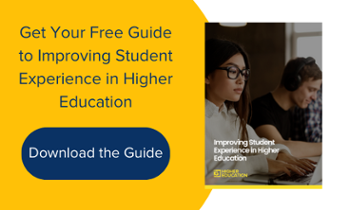It’s time for new approaches to student satisfaction and value for money
By Dr Harriet Dunbar-Morris is Dean of Learning and Teaching and a Reader in Higher Education at the University of Portsmouth.
Meeting Student Expectations
What should the Higher Education sector be doing to transform its offering during and following the pandemic to meet student expectations?
Students have had a torrid experience over the last 18 months or so and they have not, thankfully, been backwards in coming forwards about their experience. This is very useful if you are trying to work in partnership with students to develop the best teaching, learning and assessment for all students in rather trying and ever-changing circumstances.
Student Voice
The student voice is central to decision-making about academic developments used as part of the evidence-informed, data-driven approach that course teams take to continual enhancements of their course in normal circumstances.
In the current pandemic, the timescales and the fast-changing circumstances have meant that we have all had to be very fleet of foot, in terms of gathering feedback and implementing changes in-year, as lockdowns and guidelines came and went, and making plans for the larger changes which need to go through institutional change processes for future years.
Catching Up
Having reached the assessment period which marks the end of this academic year for many students, the focus now is on the support they need to catch-up on anything missed as a result of the lockdowns and government guidance in place, and preparation for the next academic year.
Student-Centred Approach
At Portsmouth the Being, Belonging, Becoming group is working to ensure that we plan learning, teaching and student experience for the summer, and then 2021-22, around students. It brings together academic and professional services staff and the Students’ Union in a joint endeavour to plan, in an integrated way, the progression, pre-arrival, induction and transitions of our students, applicants and graduates.
Managing Uncertainty
Across the sector similar work is going on. We need to consider that not only new students starting at university in September 2021, many of whom have had a rather disrupted education at school or college in the last year, need to prepare for a blended approach to their learning and teaching due to the uncertainty around what restrictions may still be in place and what may happen regarding any new variants or spikes.
Progression and Transition
It is also necessary to prepare for our second-year university students who need a different level of support for progression and transition than would be required in normal circumstances, as they have experienced a very different first year than their predecessors. We will need to work hard to build the sense of belonging and community and develop those important social networks for students in both the online and face-to-face settings in 2021-22 and beyond.
Buddying schemes are a good approach, at a course or module level and even across year-groups. In a blended approach buddying and creating networks can be enhanced or even kick-started via online means.
For example, at Portsmouth we run a very successful Welcome Ambassador scheme which creates a social network for students before they join us. Peer-to-peer support at a course-level is also very valuable, and on some of our courses students created their own Discord channel to provide mutual academic support.
Developing Best Practice
Gathering such examples of good practice and feeding them out to the wider university community creates a useful ripple effect and ensures ideas are picked up and implemented by other course teams.
It is also important to learn from what is happening elsewhere in the sector and for particular groups of students. For example, Portsmouth is leading a QAA collaborative enhancement project with Manchester Metropolitan University, Solent University and the University of Nottingham entitled Differing Perceptions of Quality of Learning.
An Evidence Based Approach
We are gathering evidence by survey and focus group from undergraduates of their perceptions of the quality of learning and teaching in the context of the pandemic, with a focus on how these perceptions differ by ethnicity. Our findings will inform our learning, teaching and student engagement plans for 2021-22 and beyond.
Dr Harriet Dunbar-Morris is Dean of Learning and Teaching and a Reader in Higher Education at the University of Portsmouth.




